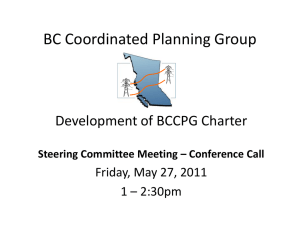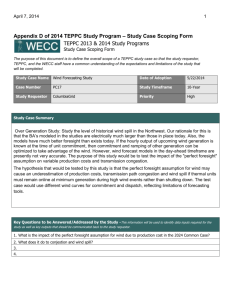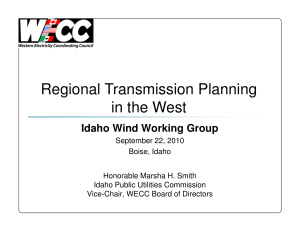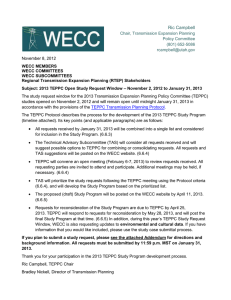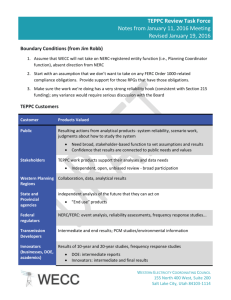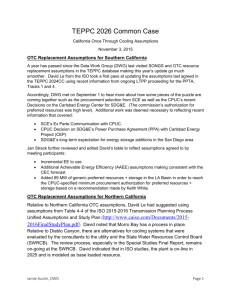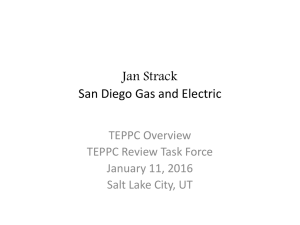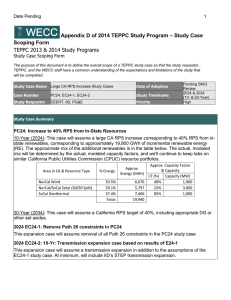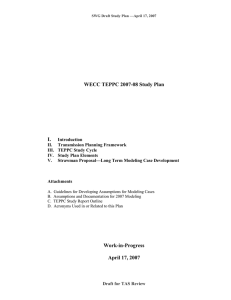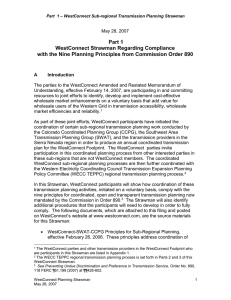Regional Transmission Planning Bob Anderson Idaho Wind Working Group September 22, 2010
advertisement
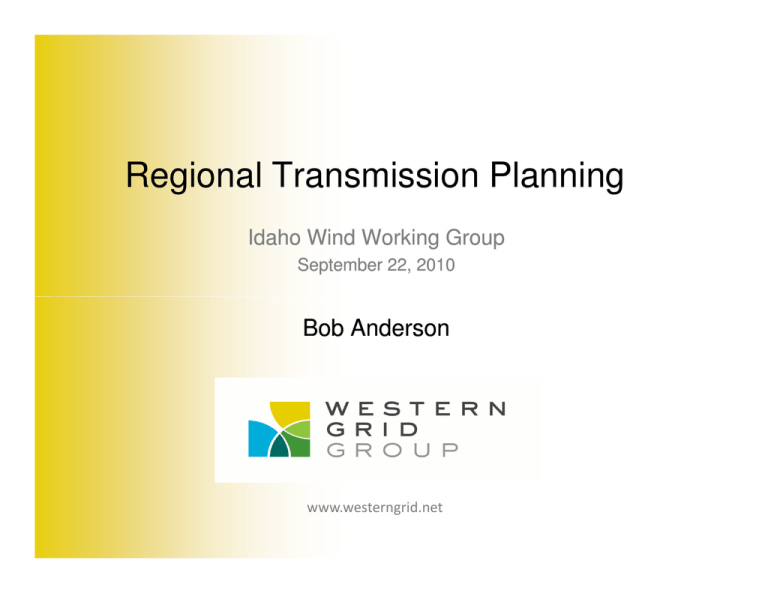
Regional Transmission Planning Idaho Wind Working Group September 22, 2010 Bob Anderson www.westerngrid.net 1 About Western Grid Group • 200 years state regulatory experience – Former chairs, staff of 8 western PUCs • 50 years experience as wind, solar, geothermal, hydroelectric power developers • Non-profit NGO • Works with Governors, utilities, regulators, agencies, advocates • Formed 2003 to develop policies to accelerate transition to sustainable electricity, win transmission access for clean resources 2 Two related programs Western Renewable Energy Zones (WREZ) Sponsored by Western Governors’ Association Regional Transmission Expansion Planning (RTEP) Project of the WECC 3 WREZ background WGA project Identify renewable resource areas to justify 500kV transmission w/low environmental impact Facilitate transmission DOE funded Kickoff May, 2008 4 WREZ—Phase 1 Phase 1 report June 2009 Identifies renewable energy zones (hubs) Modeling tool for estimating delivered cost of energy from zones http://www.westgov.org/index.php?option=com_content&view=article&id=21 9&Itemid=81 5 Hubs 6 Phase 2—Transmission Plans Develop conceptual transmission plans REZs to load RTEP Second part of presentation 7 Phase 3—Joint Resource Procurement • Identify WREZs of common interest to utilities – IRP review – Utility survey – Modeling • Engage state regulators & utilities in coordinating resource development – Survey, report, discussion groups • Opportunities for other stakeholders • Create critical mass of Tx needs in same timeframe 8 Déjà vu: Power plants • • • • • • • Palo Verde Colstrip Bridger Navajo Four Corners San Juan Intermountain 9 Déjà vu: Interstate Transmission • • • • • • • • Navajo AC Pacific Intertie DC Pacific Intertie Southwest Power Link San Juan – Vail Colstrip Intermountain DC Mead-Phoenix, Mead-Adelanto 10 Opportunities/advantages • • • • • • Economies of scale Spreading cost & risk Pooling financial resources Match with multi-state transmission Reduce timing & lumpiness issues Greater public participation & acceptance 11 Today’s barriers (real?) • Renewables different from coal, nukes, gas – Remote, fast, modular – Often PPA (not utility-owned) • Electric industry structure – Independent G&T – Separation of G&T in utilities • Cost recovery risk – Non-utility ownership • Capital, financing • Who pays for public benefits? 12 More barriers (real?) • Siting & cost allocation issues • Integration of variable generators • Regulatory & policy uncertainty • RPS, Climate, carbon, RECs • Planning – Who’s in charge? • Different state procurement rules • Short term, utilities interested in close to home resources • New technology 13 Phase 4—Permitting & Cost Recovery • Permitting – Siting • Cost allocation • Approach – Consultant to identify barriers – Workshop • Understand barriers • Explore solutions 14 Stay tuned • http://www.westgov.org/index.php?option=co m_content&view=article&id=219&Itemid=81 15 RTEP • Program of Western Electricity Coordinating Council (WECC) – Transmission Expansion Planning Policy Committee (TEPPC) • Funded by DOE (ARRA) • First Interconnection-wide plans – 10-year plans, 2011, 2013 – 20-year plan, 2013 16 Western Interconnection & subregions 17 Plans will support • Increased coordination • Increased awareness – how energy policy decisions impact transmission reliability and cost • Answering key policy questions at State, Provincial, and Federal levels • Information for use by decision makers – Siting – Cost allocation 18 Who’s on first? 19 Scenario Planning Steering Group (SPSG) • 25 stakeholders • Guide the RTEP project – – – – Recommend load & resource scenarios to TEPPC Review TEPPC’s annual study plan Communicate with constituents Outreach 20 SPSG • 5 Technology advocates (wind/solar/geothermal/nuclear/coal/EE/DSM) • 1 Transmission Owner/Operator • 1 Lands protection advocate • 1 Wildlife advocate • 8 State Officials (PUC, Energy Office, Consumer Council) • 1 Provincial Official • 1 Canadian Utility Representative • 2 Consumer Advocates • 1 Environmental Representative from TEPPC • 1 WECC Board member from TEPPC • 1 SPG representative from TEPPC • 1 LSE representative from TEPPC • 1 Tribal representative • 25 Total [7 TEPPC] 21 NGO Participation • • • • Required by DOE Advise, sit on SPSG Funding for travel and other expenditures Address technology and public interest concerns – – – – – – – – – renewable resources energy efficiency demand-side management land use wildlife consumer protection air quality and climate change carbon capture and sequestration (coal), and advanced nuclear technologies. 22 State Provincial Steering Committee (SPSC) 23 SPSC Work Groups • Energy Efficiency – Dian Grueneich, chair • Grid Utilization – Steve Oxley, chair • Scenarios – Jim Tarpey, chair 24 RTEP timeline 25 RTEP Likely outcomes • More process, meetings, talk, reports • More regional committees • Interconnection-wide “Plans” – WECC – Subregional Planning Groups • But, – No new authority • New transmission? – Maybe • Better information for decision makers – Developers – Investors – Regulators 26 Bob Anderson Western Grid Group PO Box 12105 Zephyr Cove, NV 89448 775-588-8740 bob-a@sbcglobal.net 27
